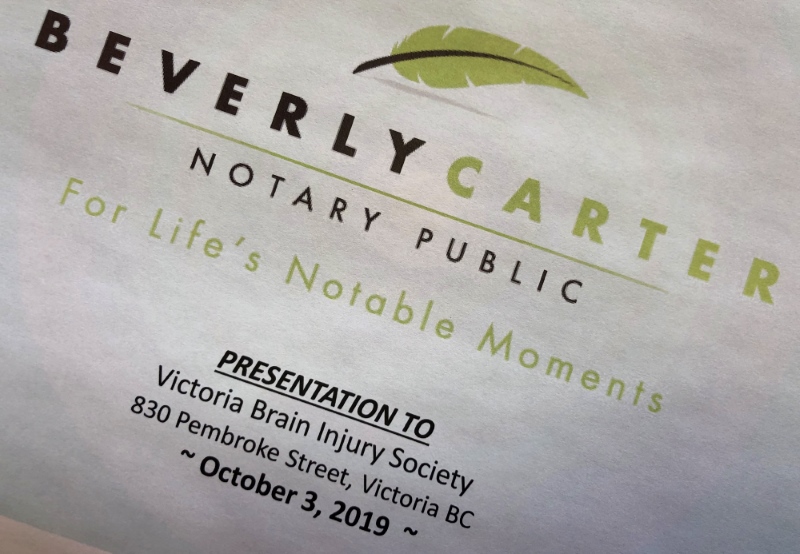Thoughts after a presentation at the Brain Injury Society
Today I presented to a group of brain injury survivors who attend support groups at the Victoria Brain Injury Society on the topic of Powers of Attorney. The opportunity to talk with this group started with a simple conversation with Tamarynn at Vancity Credit Union. When doing some business, we chatted …as anyone who knows me – I’m very good at this! We discovered a common thread of having brain injury impact us in our lives. Tamarynn volunteers with the Society and asked if I would be interested to give a talk to brain injury survivors about legal matters. Answer. Without hesitation. Yes.
Talking with brain injury survivors appealed personally. Not because I have had a brain injury but three of my immediate family members have had with varying degrees of damage. In the Winter 2019, Scrivener magazine, I wrote about health representation agreements and why these are important. I also wrote about my Dad, “My Dad’s Story”. My Dad fell down the stairs just before Christmas more than a decade ago. He landed on his head and had a severe brain injury and paralysis. He died twelve days later. The youngest of my brothers was in a serious car crash back before wearing a seatbelt was mandatory. His only injury was serious trauma to his head and brain. He was never the same after that – in fact, he exhibited classic brain injury symptoms until he died. And, my old son, at 13 years old, after doing a layup on the basket court, ricocheted off the wall and landed on ground where he was knocked out for one to two minutes. He recovered after a couple weeks but could not fly across country on a March break trip to visit his paternal grandmother. Accident, injury, and medical changes can impact us personally by happening to us, or to our loved ones. For these reasons, it is important to have our Powers of Attorney in place.
My source of inspiration to help people is my own experiences with people close to me. With a desire to implement best practices, I listen intently, objectively, to other folks experiences in order to broaden my awareness and understanding. Not only does it help as a professional, but I can be a better citizen. The group I spoke to were talkative, bright , and had excellent questions. For example, what’s the difference between a notary and a lawyer? Can I use a power of attorney in another jurisdiction? Who should I choose? What about online and computer accesses? These are frequent questions that I get in the course of any given day. The two hour presentation went fast because the group was engaged and interactive. Perhaps the biggest message that I left them with is that a Power of Attorney is an amazing and helpful tool when you really need it. But …the big BUT is that the people appointed to help aren’t always excellent or amazing. That’s why helping others to understand and make good choices is parament to the process.
Let’s be clear. As a person, I have a zero tolerance for financial abuse of any kind. These standards translate to my approach in helping clients with preparing for a Power of Attorney document. Empowering people, who are giving authority to an attorney, to know and understand how a Power of Attorney works, and that it is their document to own and control gives a healthy way to move forward. The power given to another to act on our behalf is great, so in our group we spent a lot of time reviewing who you would choose to act as your agent under a Power of Attorney. What qualities do they need?
Here are some of the traits to examine or questions that need to be asked about the person or persons being considered to act on your behalf:
* Is it a Relationship of trust? * Their Ethics * Their Personal Finances *
* Their Relationship to You * Their Location * Their Availability *
* Their Ability to Organize and Do Paperwork * Their Ability to Collaborate *
* Their Understanding of their Duties
The first point identified in our British Columbia Powers of Attorney Act under the duties identified by law is that the attorney must act honestly and in good faith.
Most of these people in attendance have had serious accidents (i.e. biking) or sudden illness propelling them into a new world where requiring help from many angles is essential during their recovery and rehabilitation. Apparently Powers of Attorney is a topic that comes up frequently in the brain injury survivors weekly meetings. The group expressed appreciation to be able to ask questions openly to further their understanding of the Power of Attorney document. I believe I left them with an awareness of how to choose the best person, and that once they do, it’s then it’s possible to put in some clauses that define how those people (the attorneys) are allowed to act for on their behalf. Ultimately, each person’s context is different and subtle. It is my job as a Notary Public to best understand my clients through open and intimate dialogue in order to guide them through the process. Ultimately, I left them with the final thought that finances can suffer in the event of a trauma, but if they have a Power of Attorney, they have back up.
Beverly Carter

Leave a Reply
Want to join the discussion?Feel free to contribute!